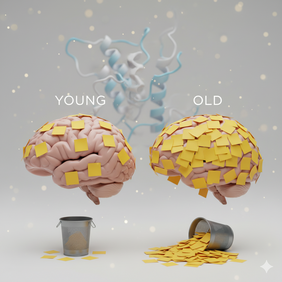Jena. As we age, the composition and function of proteins in the brain change, affecting how well our brain performs later in life—influencing memory, responsiveness, and the risk of neurodegenerative diseases. An international research team led by Dr. Alessandro Ori from the Leibniz Institute on Aging – Fritz Lipmann Institute (FLI) in Jena has now discovered that a specific chemical modification, known as ubiquitylation, plays a crucial role in these processes. This modification determines which proteins remain active and which are targeted for degradation. The findings have been published in Nature Communications.
How aging alters brain proteins
Proteins perform vital tasks in the brain—they control metabolism, signal transmission, and energy balance in cells. To function properly, they must be constantly broken down, renewed, or chemically modified. One of these modifications, the so-called ubiquitylation, serves as a kind of molecular tag: it marks proteins for degradation and regulates their activity.
“Our analyses have shown that aging leads to fundamental changes in how the proteins in the brain are chemically labelled,” explains Dr. Alessandro Ori, former research group leader at the FLI. “The ubiquitylation process acts like a molecular switch—it determines whether a protein remains active, changes its function, or is degraded. In the aging brains of mice, we observed that this finely tuned system becomes increasingly unbalanced: many labels accumulates and some are even lost, regardless of how much of a particular protein is present.”
The “recycling system” of the cell loses its power
As we age, the cell’s internal “recycling system” also begins to falter. The proteasome—a molecular machine responsible for breaking down damaged or unneeded proteins—gradually loses efficiency. As a result, proteins tagged for disposal with ubiquitin start to build up in the brain, a clear sign that its cellular cleanup machinery is no longer working properly. The researchers found that roughly one-third of the age-related changes in protein ubiquitylation in the brain can be directly linked to this decline in proteasome activity.
“Our data shows that the reduced ability of cells to completely eliminate damaged proteins is a central mechanism of the aging brain,” summarize Dr. Antonio Marino and Dr. Domenico Di Fraia, both first authors of the study. “The sensitive balance between protein synthesis and degradation shifts—a typical feature of cellular aging. In the long term, this can also impair the function of nerve cells in the brain.”
Diet as a modulator—a hopeful sign
In a further step, the researchers investigated whether the ubiquitylation patterns found could be influenced by changes in diet. To this end, older mice were fed a moderate diet (calorie restriction) for four weeks before being returned to a normal diet. The surprising result was that the short-term change in diet significantly altered the ubiquitylation pattern in the mice—in some proteins, it even reverted to the previous, youthful state.
“Our results show that even in old age, diet can still have an important influence on molecular processes in the brain,” emphasizes Dr. Ori. “However, diet does not affect all aging processes in the brain equally: some are slowed down, while others hardly change or even increase.”
The study thus provides new insights into the molecular mechanisms of brain aging. It suggests that ubiquitylation is a sensitive biomarker of the aging processes—and potentially a starting point for slowing down age-related damage to nerve cells. In the long term, the study of these processes could help to better understand the connection between nutrition, protein balance, and neurodegenerative diseases such as Alzheimer's disease.
Publication
Aging and diet alter the protein ubiquitylation landscape in the mouse brain. Marino A, Di Fraia D, Panfilova D, Sahu AK, Minetti A, Omrani O, Cirri E, Ori A. Nat Commun. 2025 Jun 6;16(1):5266. doi: 10.1038/s41467-025-60542-6.
Contact
Dr. Kerstin Wagner
Press & Public Relations
Phone: 03641-656378, Email: presse@leibniz-fli.de









